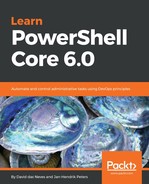The -split and -join operators are very powerful tools that you should add to your repertoire. You can easily split complex strings into sub-parts and combine them with the join operator:
|
Operator
|
Meaning
|
Description
|
|
-split
|
Split string |
Splits strings and returns values as arrays. |
|
-isplit
|
Split string—explicitly case-insensitive |
Splits strings and returns values as arrays - explicitly case-insensitive. |
|
-csplit
|
Split string - case-sensitive |
Splits strings and returns values as arrays - case-sensitive. |
|
-join
|
Join strings |
Joins strings with specific layouts together. |
First, we will take a look at the split operator. Here, you can additionally add the leading letters for case-sensitivity and case-insensitivity (-csplit and -isplit). The usage of the split operator can be executed in the following three ways:
- -Split <String>
- <String> -Split <Delimiter>[,<Max-substrings>[,"<Options>"]]
- <String> -Split {<ScriptBlock>} [,<Max-substrings>]
<String> specifies one or more strings that you want to split into parts. The easiest way to use it is as follows:
# simple usage of -split
-split "PowerShell makes fun." # 'PowerShell', 'makes', 'fun.'
In addition, you can use your own delimiter for separation:
# using your own delimiter
'ID:Name' -split ':' # 'ID', 'Name'
By default, the delimiter is omitted in the results. If you want the delimiter to be preserved, you can put the delimiter in parentheses, as follows:
# using your own delimiter - preserving delimiter
'ID:Name' -split '(:)' # 'ID', ':' ,'Name'
# using your own delimiter - preserving delimiter - omitting specific characters
'ID/:/Name' -split '/(:)/' # 'ID', ':' ,'Name'
You can also define the maximum number of sub-strings that will be returned:
# using your own delimiter with 3 maximum substrings
'ID:Name:Street:City' -split ':',3 # 'ID', 'Name', 'Street:City'
As a replacement for a defined delimiter, it is also possible to use scriptblock. Every time scriptblock returns $true, these characters are used as delimiters:
# using a scriptblock
'ID:Name:Street:City' -split {($_ -eq 'a') -or ($_ -eq 't') } # 'ID:N', 'me:S', 'ree', ':Ci', 'y'
For most examples, this knowledge will help with daily use.
Next, we will take a look at the join operator to join strings together with defined characters. There are two ways to use it:
- -Join <String[]>
- <String[]> -Join <Delimiter>
Take a look at the following example to understand the syntax:
# simple example for joining strings
-join 'P', 'ower', 'Shell' # 'P', 'ower', 'Shell' # not working as planned
-join ('P', 'ower', 'Shell') # 'PowerShell'
$strings = 'P', 'ower', 'Shell'
-join $strings # 'PowerShell'
You can also specify the delimiters for joining the strings together:
# joining with a specified delimiter
('This', 'is', 'PowerShell.') -join ' ' # This is PowerShell.
'This', 'is', 'PowerShell.' -join ' ' # This is PowerShell.
'ID', 'USER', 'NAME' -join '|' # ID|USER|NAME
For learning purposes, you can try to combine the -split and -join operators. You will need these two operators very frequently.
